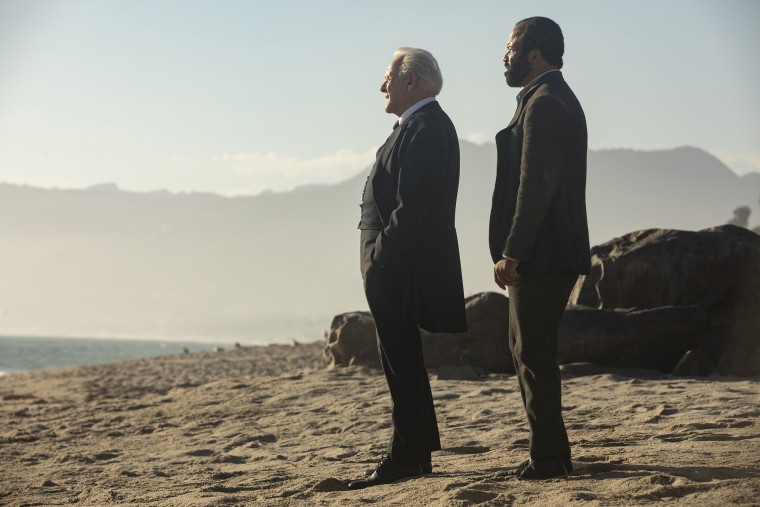The “Westworld” finale aired on Sunday night, ending a solid sophomore effort. The season held together far better this year due in large part to its actors not having to constantly hide their true nature from the audience. But the biggest reveal, which answered one of the season's most important themes, was kept under wraps until the very end: What makes hosts and humans different? The answer, according to showrunners Lisa Joy and Jonathan Nolan, provides a very dark view of humanity indeed.
Humans, they argue, are motivated primarily by our sense of sadness and regret.
"Westworld" focused a great deal this season on the "us vs. them" mentality of the park now that the host-robots have broken free. Who is morally superior? Is it the humans, who created these robots and then used them as tools, despite evidence that the beings they had created were conscious? Or is it the hosts, who massacred their captors the first chance they got?
The show focused a great deal this season on the “us vs. them” mentality of the park now that the host-robots have broken free. Who is morally superior?
Obviously, the answer is neither. So what is the difference between the two? For much of the season, it was hard to tell why anyone should root for either side. It might be better to just torch the whole lot of them and start over.
But the finale suggested there actually is a difference between humans and hosts that is far more fundamental. It lies in what is known in the show’s parlance as “cornerstones,” the memories individual hosts return to over and over and define their core selves. Host cornerstones have been discussed endlessly over the two seasons; like backstories, they make each host tick. Interestingly though, they are uniformly moments of joy and love.
A few examples: Teddy Flood (James Marsden) is driven by his love for Dolores Abernathy (Evan Rachel Wood); this thought motivates him to be a good person. Maeve’s (Thandie Newton) cornerstone is her desire to make sure her daughter has a good life. Even obscure characters have cornerstones, and all of them light up at the mention of them.
In the second season, “Westworld” dove into the cornerstones of humans. In particular, the series examined what it would mean to recreate a human mind and put into a host body, essentially ensuring a sort of immortality for those who could pay for it. But this probing of the human experience revealed something very curious about what makes humans human. The finale revealed human “cornerstones” were not joyful. Instead, humans seem to be primarily driven by life’s tragedies, the sorrow of the paths not taken and the things in life they wish they had done differently.
One of the candidates for host-enabled immortality is James Delos (Peter Mullan), the owner of the park. Earlier in the season, it was revealed that he had been trying to achieve this goal for 25 years, but the host body continually rejected his recreated brain until the experiment was abandoned as a failure. In the finale, the show delves into the earlier stages of development of this failed project, and, as a result, viewers learn that James returns endlessly to the moment when he rejected his addict son’s cries for help. His cornerstone, then, without anyone creating one for him, is the worst moment of his life.
Humans want to think they are motivated by the positive things in life. Hence, they have given their hosts cornerstones that draw on moments of beauty and love.
“Westworld” returns again to this theme in the series' first ever post-credit sequence. In it, lead human and heir to the park William (Ed Harris) is revealed to be the next candidate for a run at immortality. Considering William's storyline this season was a slow reveal of his own biggest regret — the death of his daughter Emily (Katja Herbers) — it logically follows that this memory is also his personal cornerstone. (In fact, fan theories are already proliferating that the entire second season was really just us reliving the events leading up to that memory.)
One of the unspoken details of the series is that humans don’t want to believe that tragedy is what really drives them. Humans want to think they are motivated by the positive things in life. Hence, they have given their hosts cornerstones that draw on moments of beauty and love. While the “Westworld” universe may be full of violence, the creators work to avoid hardwiring hosts with unnecessary emotional baggage.
This ultimately is the key difference between real humans and their manufactured counterparts. And yet there is a tragic consequence, because these faux-human hosts cannot achieve full consciousness without experiencing psychic agony — and similarly cannot be fully free until they feel this emotional pain as well.
No wonder the host bodies reject the human mind. In this view of humanity, creatures as miserable as us don’t deserve immortality.
Ani Bundel has been blogging professionally since 2010. Regular bylines can be found at Elite Daily, WETA's TellyVisions, and Ani-Izzy.com.
